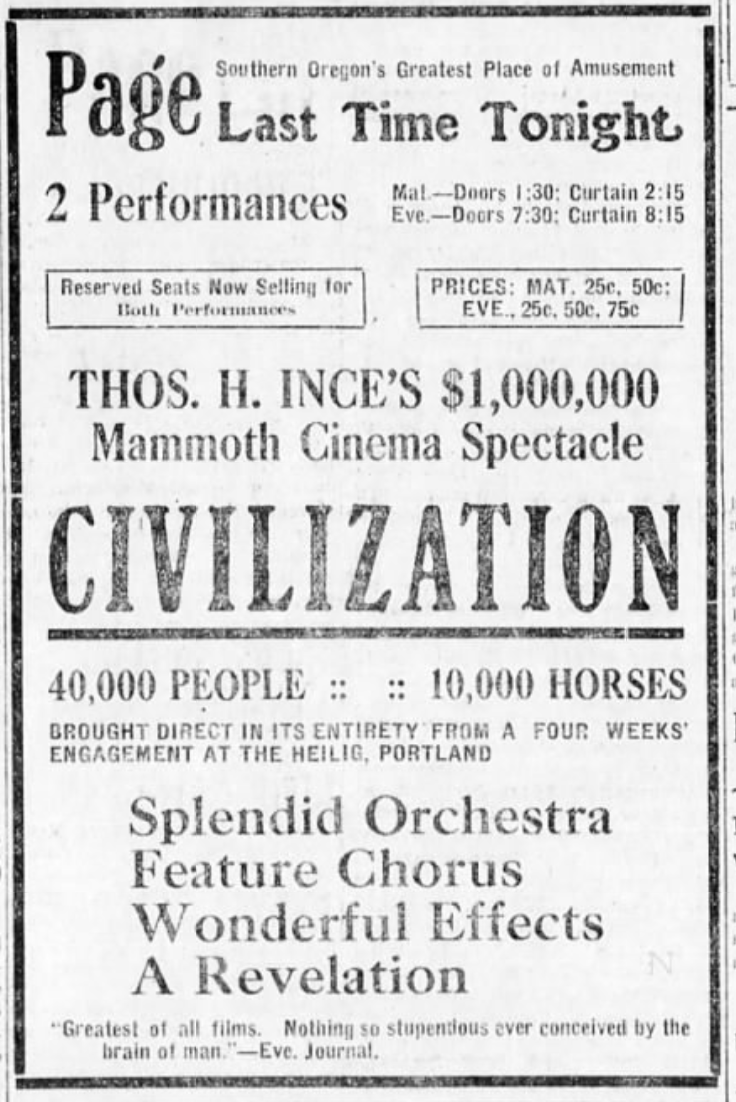“Last Time Tonight…Thos. H. Ince’s $1,000,000 Mammoth Cinema Spectacle,” reads an October 14, 1916 advertisement for the Page theater in the Medford Mail Tribune. This advertisement would have likely been quite successful in attracting a crowd for several reasons.

The first major draw is illustrated in that opening excerpt, “Last Time Tonight.” The Oregon Blue Book describes that despite the state of Oregon’s 1913 creation of the State Highway Commission, “the ‘good roads’ campaign took on real life in 1919.” In 1916, traveling outside of Medford would have required quite some effort. Since the planning of drivable roads was still in its infancy, Medford residents would have to embark on a long journey to catch the next showing of Civilization elsewhere. The advertised warning of the show’s final run would instill a sense of immediacy and importance for anybody wishing to see the film.
Another advertising ploy that likely would have been successful is the description of the film’s prior success, calling it “Thos. H. Ince’s $1,000,000 Mammoth Cinema Spectacle.” Adjusted for inflation, that would make Ince’s film a $22,084,424.78 success in 2018. While this is would not place the film in the highest grossing film rank, it would certainly suggest a certain level of popularity.
The Page Theater advertisement also states that the film was “brought direct in its entirety from a four weeks’ engagement at the Heilig, Portland.” According to Shawna Gandy of Archives West, the Heilig Theatre accommodated nearly 1,500 patrons. The fact that the film attracted enough buzz for four entire weeks in Portland was one thing. Another was that the Page would be showing the film “in its entirety,” so Medford residents could expect to see the whole film; this contrasted a showing of short clips.
In compiling each of these pieces of praise and positive descriptions, the Page Theater created an advertisement that would very likely appeal to a large population of residents of Medford, Oregon in 1916.
A final method of drawing in a large crowd comes with the endorsements at the bottom of the advertisement. In large print, the theater boasts, “Splendid Orchestra, Feature Chorus, Wonderful Effects, A Revelation.” Not only would the production feature live musical accompaniment, but it would also provide some sort of “revelation” to viewers. Language like this would likely entice viewers to seek what type of mysterious revelation awaited them. Below these claims, the advertisement quotes the Evening Journal in describing Civilization as the “greatest of all films. Nothing so stupendous ever conceived by the brain of man.”
Sources
Gandy, Shawna. “Heilig Theatre Photographs Collection, 1888-1929.” Archives West: Heilig Theatre Photographs Collection, 1888-1929, Archives West, 2006, archiveswest.orbiscascade.org/ark:/80444/xv49603.
“Oregon History: Mixed Blessings.” Oregon Blue Book, Oregon Secretary of State, 2017, bluebook.state.or.us/cultural/history/history24.htm.
